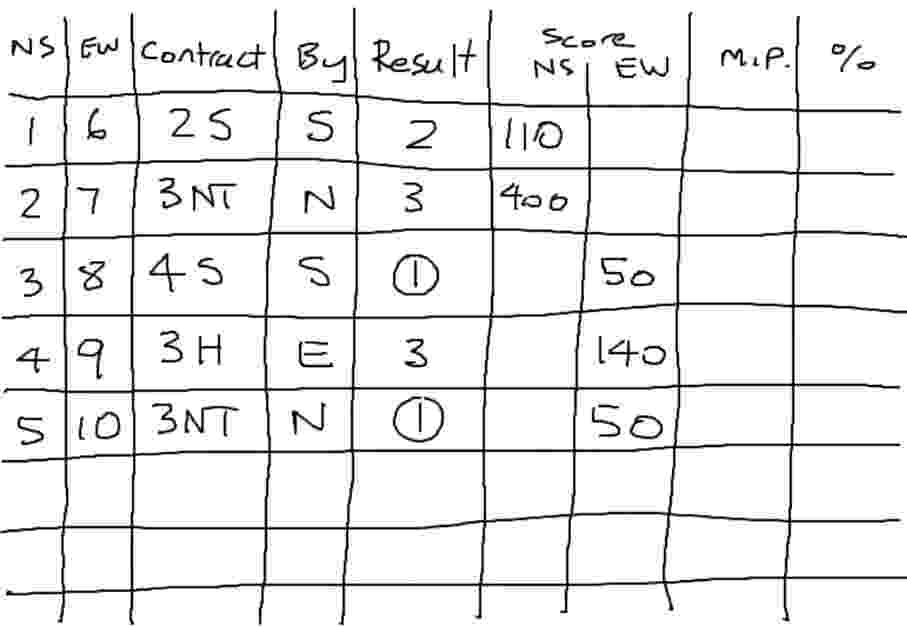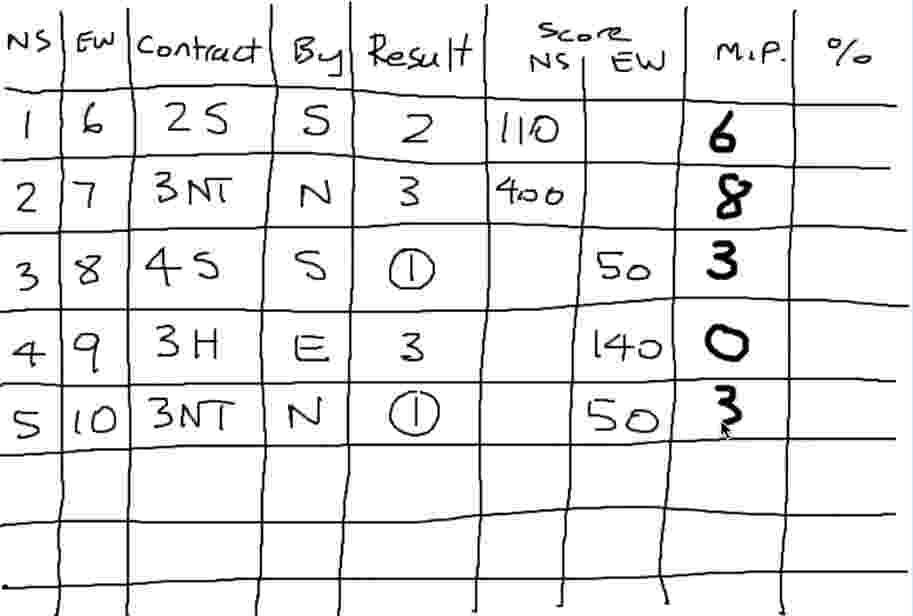How are the scores calculated in bridge?
If you are learning how to play bridge or even if you have been playing for a while learning how to score can make you a better bridge player. In this lessons we look at how the scores are calculated in duplicate bridge.
Scoring a hand of bridge
The 'Book'
The first 6 tricks you make on any hand are called the 'book' and those tricks don't count towards your score.
So, for example, if you are in a contract of 1♣ you'll need to make 1 ( because you bid 1♣ ) + 6 ( for the book ) which equals 7 tricks.
Making Contracts
The score for any making hand is made up of tricks bid + overtricks + bonus.
Tricks and overtricks
Clubs and diamonds are called the minor suits, hearts and spades are called the major suits.
♣ and ♦ = 20 points each.
♥ and ♠ = 30 points each.
NT = 40 points for the first trick then 30 points for each subsequent trick.
Bonus
Partscore - If your trick points add up to less than 100 then you win a part score bonus of 50 points.
Game - If your trick points add up to 100 then you win the game bonus. 3NT, 4♥, 4♠, 5♣, 5♦ are all game contracts. The bonus is 300 points if you're not vulnerable and 500 points if you're vulnerable.
Slam - A slam is bidding 6 and making 6 ( 12 tricks ). You win the game bonus plus another 500 not vulnerable or 750 vulnerable.
Grnd slam - A grand-slam is bidding 7 and making 7 ( 13 tricks ). You win the game bonus plus another 1000 not vulnerable or 1500 vulnerable.
Defeated Contracts
If you don't make you're contract you lose points for every trick you're short by. It's 50 per undertrick not vulnerable and 100 per undertrick vulnerable.
Matchpoints and percentages

Imagine this is the score sheet for a hand. We can see this hand has been played five different times at five different tables. So we have five different results. Of course, sometimes a hand will be played in the same contract, same number of tricks, same score at different tables. But just to show you how the scoring works, I've made each result different.
Look at line 3 where North South pair 3 has played against East West pair 8 and we see the contract was 4♠ by South going down 1 for a score of 50 to East West. That 50 to East West is the same thing as minus 50 to North South.
Look at line 4. East was in 3♥ making three for 140 to East West. I could just as accurately have written -140 to North South. Whatever is plus for East West is minus for North South and vice versa.
Each North South pair wins two match points for every other North South pair that they beat and one match point for every other North South pair that they tie with.

Look at line 1 where North South scored 110. How many other North South pairs did pair 1 beat? 110 is not as good as 400, so nothing there but 110 is better than minus 50, which North South pair 3 scored. So North South pair 1 get two match points for beating pair 3, two match points for beating pair 4 and two match points for beating pair 5. So North South pair 1 win 6 match points.
Pair 2 North South scored 400 and beat everybody. 400 is better than 110. It's better than -50, better than -140, 50. So eight match points.
Pair 3 were minus 50. 50 to East West is -50 to North South. Is -50 better than 110? Obviously not. Is -50 better than plus 400. No. Is -50 better than -140? Yes! So even though pair 3 were -50 in the score, that's still better than -140, which pair 4 scored. So North South 3 win two match points for beating pair 4. Pair 3 tied with pair 5 so that's another one match point. So two for the win, one for the tie, three match points for pair 3.
Pair 4 north south were -140 beating nobody.
Pair 5 north south were the same as pair 3.
tags: #scoring
